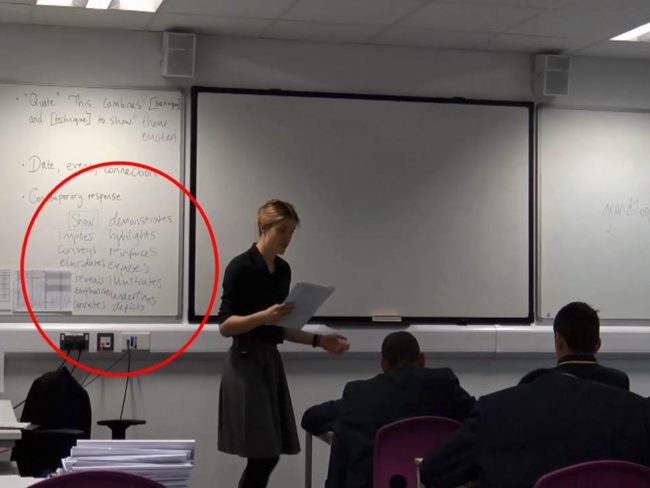01.06.17Building Academic Vocabulary: A Postcard from Jo Facer’s Classroom

A few weeks ago we shot video at the Michaela School in London- truly a thought-provoking and inspirational place. I’ve just started in watching the footage, beginning with Jo Facer’s English class, and have already found a dozen moments I’m going to cut video of. But for now I just want to share a photo of Jo’s class.
In this lesson, she and her pupils are reading Othello. It’s a rich and rigorous discussion. In one moment that I love, Facer is reading aloud from the text. She pauses:
Facer: Notice that the Duke of Venice asks Othello: “What can you say?” And Brabantio answers, “Nothing.” What does that display? The Duke is asking Othello but Brabantio answers. Why, Lamar?
Lamar: “It shows the disrespect that Brabantio has for Othello.”
Facer: Good, instead of saying ‘shows,’ though, what other word could you use?
Lamar: Depicts
Facer: Yes it depicts the disrespect Brabantio has for Othello. He does not let him speak.
A moment later Facer pushes them a bit further. What else could it show, she asks, making note of the character’s differing skin color. “It shows his racism,” Takila offers.
“Good,” Facer says “But again…” here she points at the board, and Takila revises: “It implies his racism.”
In both of these interactions, Facer pushes her students to use the terms of academic discourse to discuss the play. This not only improves their vocabulary but it prepares them to write since her requests for better words focus on the verbs that describe what a text for shows or says. These are words students would use–words these students will use later in the class– in writing a literary response.
This brings me to the picture. On the board you can see a list of more advanced words for her students to use is discussing what a test shows or says: implies, conveys, demonstrates, highlights, elucidates, reveals emphasizes, connotes, reinforces, illustrates depicts, exposes, underlines.
Many teachers might suggest to students such a list of better words to use in their writing, but we are all prisoners of short term memory and students learning new material are especially so. You could give them a list of advanced words but would they remember them when they needed them? Could they do so while also filling their imaginations with the drama of Othello?
Putting the words on the board allows students see them and be reminded of them even while their active memory is full of other things as they are discussing the play. With just a gesture to the board, Jo causes Takila to revise her original statement to the more sophisticated “implies.”
So simple; so powerful. Really any teacher could do this–make key terminology constantly visible and actively ask students to use it–but the application to English classes that allows students to transfer their new vocabulary quickly into their writing is especially powerful.

I worry a lot that this technique can wrong where students just want use an “advanced” word rather than a word that truly matches what they mean.
This is where “right is right” comes in — a serious teacher of language would be careful to unpack the nuances of the vocabulary on offer and would explore/remind why one of them isn’t quite right, if necessary. From what I’ve seen out of this school, I’d bet they’re not accepting almost-right usage 🙂
Does anyone know if there are any good, comprehensive lists of academic vocabulary like this available publicly on the internet, or in any other publications?
I have a list of Analytical verbs. If you want them send an email to iago99@hotmail.com
I’m afraid I agree with the previous post – in fact the lesson demonstrates this. ‘Depicts’ is not the right word in the context. Neither is ‘display’, come to that. You can’t simply teach vocabulary by using a thesaurus. Students have to be aware that there are differences between show, display, depict and imply otherwise what is the point of adding these words to their vocabulary?
Had a much longer response,but time limit ended. Love the technique and do not see that Alexander’s concern is a problem.
Agreed.
I agree, a lovely simple yet elegant way of teaching. Really well done Jo.
I wonder though – this is what I see very often when I inspect classrooms in my school and across the country, expected behaviour from good practitioners leading to the focussed development of skills.
Many teachers use place mats, carrying the higher level vocab and concepts; this means the next time such work is delivered it can be less teacher directed and giving a change in touch and feel. Not better, but building a different way of working around the same skill acquisition.
How can it not be a win for the students when they are pushed to a higher level of academic discourse? This develops the habits of mind we are looking for to use precise vocabulary.